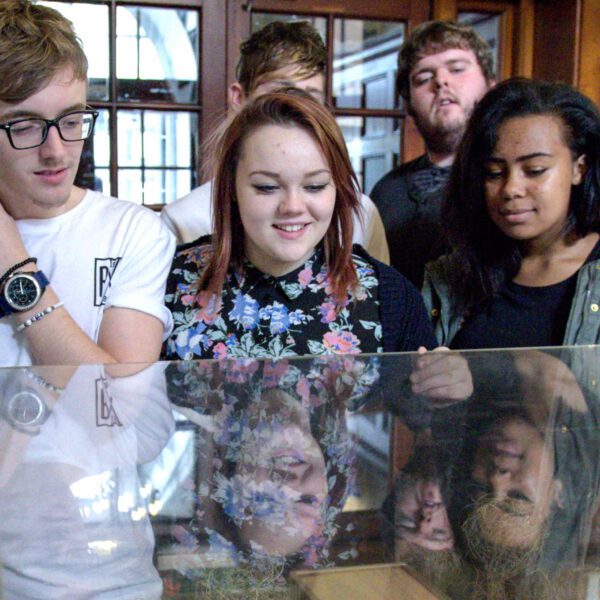Safeguarding
This is our policy for protecting young people under 18, and other vulnerable people
The National Youth Arts Trust (hereafter NYAT) understands the vital importance of having proper safeguards in place for the protection of young people under 18 years of age and other vulnerable groups. NYAT recognises its responsibility to ensure that those benefitting from, or working with NYAT, are not harmed in any way through contact with the Trust.
Trustees, employees, volunteers and adult beneficiaries of NYAT must always act in accordance with our Safeguarding Policies and follow the procedures and best practices as indicated below.
Declaration
The National Youth Arts Trust strongly believes:
- The welfare of a child is paramount;
- All children without exception have the right to protection from abuse regardless of gender, ethnicity, disability, sexuality or beliefs.
Child protection policy
Definition of child abuse
Child abuse happens when an adult inflicts harm on a child or young person, even, in some cases, if the adult’s actions are not deliberate. There are four broad categories of child abuse:
- physical abuse
- sexual abuse
- neglect
- emotional abuse.
Physical abuse happens when a child is deliberately hurt, causing injuries such as cuts, bruises and broken bones.
Sexual abuse involves forcing or enticing a child or young person to take part in sexual activities.
Neglect is persistently failing to meet a child’s basic physical and/or psychological needs resulting in serious damage to their health and development.
Emotional abuse can severely damage a child’s emotional development. Active emotional abuse involves an adult deliberately trying to scare, humiliate or verbally abuse a child. Passive emotional abuse happens when a parent or carer denies the child the love and care they need in order to be healthy and happy.
The National Youth Arts Trust will ensure:
- all concerns, and allegations of abuse will be taken seriously by trustees, employees and volunteers and responded to appropriately – this may require a referral to children’s social care services, the independent Local Authority Designated Officer (LADO) for allegations against staff, trustees and other volunteers, and in emergencies, the Police.
- safe recruitment, selection and vetting for all trustees, employees and volunteers; all employees and volunteers who come into regular direct contact with the young people we work with, will be required to have an enhanced Disclosure & Barring Service check.
- trustees, employees and volunteers are clear on NYAT’s policies and procedures in regards to children’s safety and well-being.
Code of behaviour
Each trustee, employee and volunteer has a responsibility to ensure that young people are protected from harm. It is the responsibility of all to ensure that:
- Their behaviour is appropriate at all times and they provide a good example of acceptable behaviour.
- They recognise the position of trust in which they have been placed.
- The relationships they form with the young people under their care are appropriate.
- They show respect and understanding of young people, and their safety and welfare, and conduct themselves in a way that reflects our principles.
How to recognise the signs of abuse
Children rarely tell if they are being abused. However, there may be signs that are an indication of a child being neglected or abused. The child or young person may:
- have unexplained bruising, or bruising in an unexpected place
- appear quiet, withdrawn, or afraid
- be afraid to go home
- appear constantly hungry, tired or untidy
- be left unattended or unsupervised
- have too much responsibility for their age
- be acting in a sexually inappropriate way
- be misusing drugs or alcohol
- tell you something that sounds as if they have been hurt by someone.
Procedures
How to respond to allegations, disclosures or suspicions of abuse:
All allegations, disclosures or suspicions of abuse, no matter how insignificant, must be recorded on an incident form and sent to the Director of Operations (DoO) in the first instance: admin@nationalyouthartstrust.org.uk. The DoO will refer the incident to the Chair of the Board of Trustees (who is our designated child protection officer). No information must be withheld.
The persons involved must not investigate the allegations, disclosures or suspicions but always refer to the Chair of the Board or in the event the chair is unavailable, the Local Authority Designated Officer (LADO) should be contacted dependent on the location the situation has occurred. The appropriate LADO’s contact details will be made known on the outset of any new charitable activities.
Confidentiality policy
Privacy and confidentiality should be respected where possible but if this leaves a child at risk of harm then the child’s safety has to come first.
Not everyone needs to know when a concern or worry is raised. This respects the child’s, family’s and/or staff’s rights to privacy. Only refer an incident to the Chair of the Board of Trustees or in the event the chair is unavailable, the Local Authority Designated Officer (LADO) should be contacted.
It is however, fine to say that a concern has been raised and it is being dealt with following NYAT’s procedures.
Health and safety policy
The National Youth Arts Trust is committed to ensuring those coming into contact with the Trust, either as a beneficiary of charitable activity, supporter of our work, volunteer, trustee or employee, are given a safe environment to work in. Everyone has a right to work in places where risks to their health and safety are properly controlled.
The NYAT will ensure we:
- prevent accidents and cases of work-related ill health by managing the health and safety risks in the workplace
- provide clear instructions and information, and adequate training, to ensure employees are well equipped to avoid hazards and contribute positively to effective Health and Safety at work
- engage and consult with employees and beneficiaries on day-to-day health and safety conditions
- implement emergency procedures – evacuation in case of fire or other significant incident.
Procedures
For every new charitable or fundraising activity, the National Youth Arts Trust will ensure employees, volunteers and trustees are equipped with the following tools and information to promote a healthy and safe environment at work:
- An updated risk assessment relevant for each new charitable or fundraising activity, which highlights any minor or significant risks related to the activity(s) in question. Risk assessments will be reviewed when working habits change or conditions change (please see our risk assessment policy below for more information).
- A First Aid Box.
- The procedures to follow in the event of an emergency situation, including fire safety information for each new venue used in a charitable or fundraising activity; ensuring the nearest fire exits and fire safety procedures are recorded and known by all. A venue must have fire alarms which are tested at regular intervals. Evacuation plans will be tested regularly and updated as necessary and escape routes should be well signed and kept clear at all times.
- Manual handling safety instructions will be provided for beneficiaries, employees and other relevant persons during any charitable or fundraising activity.
- Toilets, washing facilities and drinking water will be provided. Inspections of the space NYAT is working in will be routinely carried out.
- An incident record book must be used if ever an incident occurs during a fundraising or charitable activity and made known to the NYAT administrator. All records of incidents must be countersigned.
- A full register of participant’s names and contact details.
- Emergency contact details of the young individuals involved in a charitable or fundraising activity.
- Parental/guardian consent forms including photography consent from both parents/guardians and participants and travel arrangements as agreed with the parents/guardians for those under the age of 18 and those considered vulnerable adults.
- The Local Authority Designated Officer contact details (to be used in the event of allegations, disclosures or suspicions of abuse, as referred to in the Child Protection Procedures section of this Safeguarding Policy).
Employees will be routinely consulted on health and safety matters as they arise but also formally consulted at regular health and safety performance review meetings or sooner if required. Employees will be given necessary health and safety information, according to their role and the type of work they will carry out. Manual handling, fire safety and first aid will be the main health and safety concerns for the type of work the charity carries out.
Risk assessment
When conducting a risk assessment for every charitable or fundraising activity, the National Youth Arts Trust will consider:
- the practical detail of a project
- things that can go wrong in the project
- likelihood of these things going wrong
- impact of these things going wrong
In order to minimise the potential risks arising the NYAT will:
- identify measures to reduce the risk
- decide what to do if things do go wrong
- ensure our risk assessment procedures are closely monitored
Procedures
Youth theatre projects
Our main charitable activity is our youth theatre projects which each require a full risk assessment. In order to minimise general risk when running our youth theatre projects, the following procedures are carried out:
- Workshop leaders are responsible for leaving the workshop space clear of furniture at the end of every session to avoid slips and trips.
- Chairs should be safely stacked and fire exits must be left clear of any obstructions.
- Leaders must ensure that fire exits remain clear during sessions when furniture may be moved around.
- The nature of the performing arts involves physical activity, and young people should be properly instructed and supervised and must be given the option to sit out of activities where they feel unsafe or uncomfortable.
- There must be adequate space for any physical activity and no obstacles in the space.
- Workshop leaders should promote spatial awareness during physical activity, such as jumping, running and dancing – ensuring participants are aware of their surroundings.
- Leaders should consider the appropriateness of the activities to the age, ability and experience of the young people they are working with in relation to health and safety issues.
- Young people should be properly instructed in the use of technical equipment and supervised where appropriate.
- Young people should be regularly reminded of their contribution to the health and safety of themselves and others.
- Leaders must always consider health and safety issues in the design, construction and use of a set for performance projects.
- Leaders should familiarise themselves with the venue’s fire safety procedures and consider all health and safety issues when working.
- All use of theatre lighting, sound equipment and other electrical items will only be allowed under the supervision of a trained professional technician.
- Participants will be asked to wear sensible, comfortable attire and remove items such as jewellery, which may prove a hazard during the workshop.
- Workshop leaders should ensure adequate ventilation, light and heating throughout the space.
- Workshop leaders should check any furniture used is in good repair and any permanent fixtures in good condition – notifying the NYAT of any equipment in disrepair.
- Leaders must ensure any work at a height is carried out using a step ladder. Any work taking place at a height which a step ladder cannot reach, should be carried out by a professional technician.
Fundraising activity
To minimise general risk when holding a fundraising event, the following procedures will be carried out:
- Inspections of the space NYAT is working in will be carried out to check for any potential hazards.
- NYAT event organisers should check any furniture used is in good repair and any permanent fixtures in good condition – notifying the NYAT of any equipment in disrepair.
- NYAT event organisers should familiarise themselves with the venue’s fire safety procedures and consider all health and safety issues when working.
- NYAT event organisers should ensure adequate ventilation, light and heating throughout the space.
- NYAT event organisers must ensure any work at a height is carried out using a step ladder. Any work taking place at a height which a step ladder cannot reach, should be carried out by a professional technician.
- Fire exits must be left clear of any obstructions.
- NYAT event organisers are responsible for ensuring the space is clear of any obstacles to avoid slips and trips.
- NYAT event organisers should ensure that food and drink is refrigerated and prepared in sanitary conditions.
Transportation
In order to minimise general risk when providing transportation for participants involved in a charitable or fundraising activity, the following procedures will be carried out:
- A fully qualified driver with MiDAS training and DBS check will be hired.
- The driver will check the vehicle is safe to drive before each journey and that there is enough petrol.
- The vehicles will be hired from reputable organisations, preferably associated with the council, a local school or another charity.
- Where possible, a member of staff will accompany participants under the age of 18 on journeys.
Each new charitable activity and fundraising activity will carry different and more specific risks, so for every new charitable and fundraising activity, NYAT will ensure a thorough risk assessment is carried out before, during and after.
NYAT uses the official risk assessment template published by the Health and Safety Executive, in order to assess each new charitable or fundraising activity.
Anti-bullying policy
It is the policy of the National Youth Arts Trust to provide a neutral and harmonious environment which is free from harassment and intimidation, where all employees, trustees, beneficiaries, volunteers and supporters are treated with dignity and respect. Bullying or harassment is unacceptable and will not be tolerated under any circumstances.
All employees, trustees, beneficiaries, volunteers and supporters of the NYAT are expected to comply with this policy and not to behave in a way that humiliates, intimidates or undermines others.
The NYAT is dedicated to ensuring that all participants and employees involved in our charitable activities are treated and valued equally, regardless of where they live in the United Kingdom and irrespective of sex, gender identity, ethnicity, religion, additional educational needs, disability and sexual orientation.
Bullying is any persistent behaviour, directed against an individual, which is intimidating, offensive or malicious and can undermine the confidence and self-esteem of the recipient. Bullying is largely identified by the affect it has on the individual rather than what has actually been done. Harassment is any unwanted non-verbal, verbal or physical abuse, advances and behaviour which an individual may find offensive, distressing and/or unwanted.
The National Youth Arts Trust endeavours to ensure that a secure environment is provided for every young person who wishes to participate in the performing arts.
Definition
Bullying and harassment can be:
- Emotional – being deliberately unfriendly, excluding, and tormenting (e.g. hiding possessions, using threatening gestures)
- Physical – pushing, hitting, kicking or any use of violence
- Racist – racial taunts, graffiti, gestures
- Sexual – unwanted physical contact or sexually abusive comments
- Homophobic – because of, or focusing on the issue of sexuality
- Religious – because of or focusing on the issue of faith
- Verbal – name-calling, sarcasm, spreading rumours
- Cyber – all areas of internet, such as e-mail, social media and internet chat room misuse, mobile phone threats by text messaging and calls or misuse of associated technology, i.e. camera and video facilities
This list is not exhaustive.
Legitimate, constructive and fair criticism of a participant’s performance or behaviour during a charitable activity is not bullying. An occasional raised voice or argument is not bullying, as long as participants are treated with dignity and respect.
It is the responsibility of trustees, employees and volunteers to ensure the implementation of NYAT’s Anti-Bullying Policy to minimise occurrences of bullying. During any charitable or fundraising activity employees should encourage all participants to report instances of bullying happening to them or which they see happening to others. Employees will use their experience and discretion to establish the seriousness of the allegation but are themselves encouraged to report the allegation to their trustee link to discuss possible action. This might include discussion with individuals, the whole group or involvement of parents. Where bullying has been established, a written record will be made and sent to the Chair of Trustees via the NYAT Director of Operations (DoO).
In our youth theatre projects, workshop leaders are encouraged to raise awareness about bullying through workshop content as part of regular workshop activities; raising awareness about bullying and the forms it can take. This will encourage an open discourse about the issues surrounding bullying and how best to tackle it.
Procedures
- Incidents should be reported to workshop leaders and subsequently to the Chair of the Board of Trustees via the DoO. NYAT will ensure that all incidents are dealt with as quickly as possible in order to create the least possible stress for both the complainant and the alleged perpetrator.
- Incidents will be recorded by leaders with a countersignature and passed to the DoO who will take responsibility for the safe storage and processing of this information. All information gathered will be treated with strict confidentiality.
- In serious cases, parents will be informed and will be asked to visit to discuss the problem.
- In extreme cases, if necessary and appropriate, particularly ‘cyber-bullying’, the police will be consulted.
- The bullying behaviour or threats of bullying must be investigated and the bullying stopped quickly.
- An attempt will be made to help the bully (bullies) change their behaviour.
Outcomes
- The bully (bullies) may be asked to genuinely apologise and other consequences may take place.
- In very serious cases, suspension or exclusion could be considered.
- If possible, the participants will be reconciled.
- After the incident(s) have been investigated and dealt with, each case will be monitored in striving to ensure repeated bullying does not take place.
Recruitment and selection policy
Procedures
The protection of children and young people from harm must be a primary consideration in developing a thorough method of recruiting, selecting and managing staff and volunteers. To ensure a thorough recruitment and selection process, the National Youth Arts Trust will follow procedures as below when recruiting new employees, contract workers, new trustees and volunteers:
- There will be a clear job description for staff and a role description for volunteers and new trustees, and a person specification outlining key skills and abilities required for the post. Job descriptions will include only those requirements that are necessary for the effective performance of the role.
- The post will be approved by the Board of Trustees.
- There will be an open recruitment process, with accurate and detailed recruitment material drawn up outlining the role of the organisation and the particular responsibilities and requirements expected of staff and volunteers. This will be circulated as widely as possible.
- No recruitment literature or advertisements will imply a preference for any one group of applicants unless there is a genuine occupational qualification which limits the post to this particular group, in which case this must be clearly stated.
- Applicants must provide a CV that covers past work/volunteering and a covering letter explaining why they are suitable for the post in question.
- There will be an interview process suitable to the role and task, with at least two representatives of the organisation conducting an interview where information contained in the application will be compared against the kinds of qualities and skills needed for the post. For example, any previous experience of working or contact with children would be of particular relevance. Expectations, working conditions etc. will also be discussed. Short listing of interviewees will be conducted on an objective basis and deal only with suitability for the job. Any questions asked in respect of personal circumstances will relate purely to the job requirements and be asked of all candidates for the post.
- Enhanced DBS checks are sought for those working with children and young people in regulated activity and other roles where appropriate. The post will not be offered until these checks have been cleared.
- Applicants working with children and young people will sign a declaration form declaring any past (including spent) criminal convictions, cautions and cases pending against them.
- Applicants will also be asked to sign a declaration form stating that there is no reason why they should be considered unsuitable to work with children. This information will be dealt with in a confidential manner and not used to discriminate against applicants unfairly.
- Written references will be sought (and followed up orally, when necessary).
- The same recruitment procedures will be applied consistently, regardless of the position being filled.
NYAT is committed to eliminating discrimination and encouraging diversity amongst our workforce. It is NYAT’s policy to ensure that staff and associates are recruited, remunerated, developed and promoted on the basis of skills and suitability for the work performed. The Company is committed to ensuring that no employee, associates, or anyone seeking employment with the Company, receives less favourable treatment on grounds of colour, race, religion, national or ethnic origin, gender, marital status, disability, age or sexual orientation. All staff and associates, whether full time, part time, permanent or temporary, will be treated fairly and with respect.
Trustees will discuss particular individual requirements for all staff and associates regarding any medical conditions/ disabilities when relevant to the job. They will seek competent advice in order to make reasonable adjustments to selection procedures, working arrangements and the physical features of the premises when it would be practical, effective and economic to do so.
All staff and associates are accountable for ensuring that this policy is actively pursued and put into practice.
Regulated activity policy
Definition
Regulated Activity is activity that must not be carried out if you are barred from working with children or vulnerable adults. The full legal definition of regulated activity is set out in Schedule 4 of the Safeguarding Vulnerable Groups Act 2006 as amended by the Protection of Freedoms Act 2012.
The scope of Regulated Activity for work with children and young people is:
- Unsupervised activities: teaching, training, instructing, caring for or supervising children, or providing advice/ guidance on well-being, or driving a vehicle only for children
- Work for a limited range of establishments with opportunity for contact. For example – schools, children’s homes, childcare premises (but not work by supervised volunteers)
In this context, ‘regular’ means carried out by the same person frequently (once a week or more often), or on 4 or more days in a 30-day period (or in some cases, overnight).
Work that was previously Regulated Activity for work with children but will no longer be regulated includes:
- Activity supervised at reasonable level
- Health care not by (or directed or supervised by) a health care professional.
- Legal advice
- “Treatment/ therapy” (instead “health care”) unless this is ‘’advice/guidance on well-being’’
- Work in ‘’specified places’’ which consists of occasional or temporary services, e.g. maintenance (not teaching etc.)
- Volunteers in ‘’specified places’’ supervised at reasonable level.
- All “positions” e.g. governors, trustees etc.
- Work carried out by inspectorates
The issue of whether or not activity is considered to be Regulated under the new definition may depend in many cases on whether it is supervised or not. The legal definition of supervision in the Protection of Freedoms Act 2012 states that the supervision should be:
- ‘regular’
- ‘day to day’
- ‘reasonable in all the circumstances for the purpose of protecting the children concerned’, and
- ‘carried out by someone who is in regulated activity’
Procedures
When recruiting, if the post does not involve work covered by the definition of Regulated Activity, NYAT will not be able to ask for a check of the barred list for the person(s) we are considering for that role.
However, if the post involves work that would have been classed as Regulated Activity under the old definition, NYAT will still be able to ask for an enhanced Disclosure & Barring Service check, but this check will not include information about whether or not that person is on the barred list.
NYAT will ask for an enhanced DBS check on roles that involve regularly caring, training, supervising or being by yourself and responsible for children. In these situations, ‘regularly’ is not defined but is commonly taken to mean at least once a month.
In all circumstances when an employee, trustee or volunteer is involved in a Regulated Activity, NYAT will ask for an enhanced DBS check; the position will not be offered until these checks have been cleared. All staff working in Regulated Activity will still be supervised at regular intervals by the NYAT Director of Operations and the Board of Trustees, ensuring our work continues to be of good quality and our policies and procedures are being adhered to by our employees when working remotely.
Staffing ratios
In youth work practice, the ratio of legally responsible adults to children/young people tends to be 1:8 regardless of age. Other guidance suggests 1:10 for older children.
NYAT will have a minimum of two staff with legal responsibility present at all times and that children under 8 years old are supervised all the time.
Our Youth Theatre groups will not have more than 30 participants per workshop session.
Photography and film
The National Youth Arts Trust uses photography and film to document our charitable and fundraising activities and the achievements of our work, and that of our beneficiaries.
However, it is important to be aware of safeguarding issues when taking photos or filming at events.
In order to reduce the potential for misuse of images, the National Youth Arts Trust will;
- not use children’s full names, or other personal information in photograph captions if publishing the photographs publicly
- use a parent/guardian permission form to obtain consent for a child to be photographed and videoed and that their image may be used on our website, in reports or social media pages
- obtain the child’s permission to use their image
- only use images of children in suitable clothing to reduce the risk of inappropriate use
- state written expectations of professional photographers or the press who are invited to an event and not allow photographers unsupervised access to children
- not approve photography sessions outside the event or at a child’s home
- ensure images or video recordings of children are kept securely
- reconfirm consent for using the images every two years, and avoid using old photographs
Procedures for payment/ financial arrangements
Payments made by the National Youth Arts Trust and payments due to the National Youth Arts Trust between beneficiaries and the charity will be arranged in the following ways:
- Debit or Credit card, PayPal, cash or cheque can be used when payments are due to the National Youth Arts Trust – either via our website, PayPal page, via our PayPal payment device or cash or cheques for transactions made face-to-face. Cheques must be made payable to the National Youth Arts Trust.
- Payments made by the National Youth Arts Trust will be paid by bank transfer with a valid invoice. Payments will be made per our Internal Financial Control procedures with dual authorisation.
- Payments regarding our bursary scheme will be made as follows; tuition fees will be paid directly to the place of tuition and any other costs incurred, which NYAT has agreed to cover, will be paid directly to the bursary recipients via bank transfer on presentation of the appropriate receipts.
All payments will be made by our Director of Operations and authorised by our treasurer according to our Internal Financial Control procedures.
Youth participation policy
This policy ensures that young people are empowered within the process of safeguarding and have an active say in our decision making related to their safety. The National Youth Arts Trust will ensure young participants are consulted on our safeguarding policies and practices to ensure they benefit and feel confident in NYAT’s policies.
Complaints procedure
The National Youth Arts Trust aims to provide a high level of service at all times, but if you feel we have not met this high level of service in anyway, please do not hesitate to contact us with any comments or complaints you may have. We value your feedback and in the event of a complaint, we will address your concerns as soon as possible. Formal complaints and feedback can be made in writing, by post or email, to our Director of Operations (DoO):
Director of Operations
National Youth Arts Trust
PO Box 225
Chessington
KT9 9EB
admin@nationalyouthartstrust.org.uk
Please mark your envelope or message as ‘Private and confidential’.
However, if your complaint is about our DoO, you should write directly to the Chair of the Board of Trustees via our principle office:
Chair of the Board of Trustees
National Youth Arts Trust
PO Box 225
Chessington
KT9 9EB
The National Youth Arts Trusts’ responsibility will be to:
- acknowledge the formal complaint in writing as soon as possible;
- respond as fully as possible within the time stated in the initial acknowledgement (usually 10 working days);
- deal reasonably and sensitively with the complaint;
- take action where appropriate.
A complainant’s responsibility is to:
- bring their complaint, in writing, to the National Youth Arts Trusts’ attention, normally within four weeks of the issue arising;
- explain the problem as clearly and as fully as possible, including any action taken to date;
- allow the National Youth Arts Trust a reasonable time to deal with the matter;
- recognise that some circumstances may be beyond the National Youth Arts Trusts’ control.
What will we do with your complaint?
The administrator receiving your complaint will acknowledge receipt as soon as possible. The administrator will then discuss the details of your complaint with our Chair, and will log the complaint in our formal complaints log. Depending on the nature of the complaint, we may also consult other relevant people including other members of our Board of Trustees.
At any time during the process you may be asked to attend a meeting to discuss your complaint with the person conducting the investigation. You may also be contacted by letter or telephone to discuss or clarify particular aspects of your complaint. You are asked to co-operate at every stage where requested.
When should I expect a response to my complaint?
Our target is to provide you with a considered response no later than 10 working days from receiving your complaint. We will keep you informed of progress and set a specific date by which we will be able to give you a full reply.
What if I’m unhappy with the response to my complaint?
If you are unhappy with the response we make to your formal complaint, please write, within one month, to the National Youth Arts Trust’s DoO (contact details as above). The DoO will review your complaint and our response to you. A reply will then be sent to you within 10 working days. If you remain dissatisfied (or if your complaint is about the DoO) you may then appeal the decision to our Board of Trustees by writing to:
Chair of the Board of Trustees
National Youth Arts Trust
PO Box 225
Chessington
KT9 9EB
Policy review
The National Youth Arts Trust is fully covered by a leading insurer and will review insurance needs on a project by project basis to ascertain if any additional cover is required.
The National Youth Arts Trust is committed to ensuring that its staff, Board and other volunteers are trained and regularly updated to enable all our company policies are understood and implemented.
This policy is reviewed and approved by the Board of Trustees annually or when legislation changes.
May 2023







